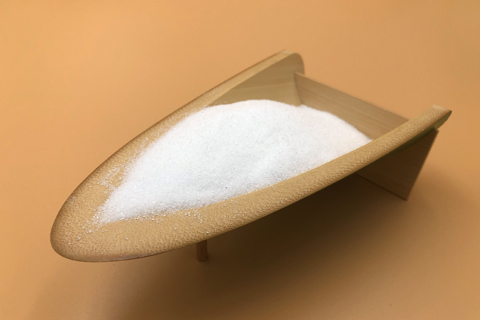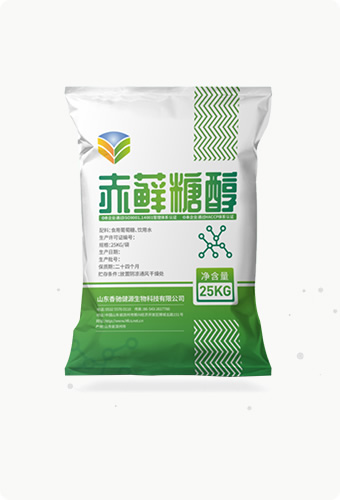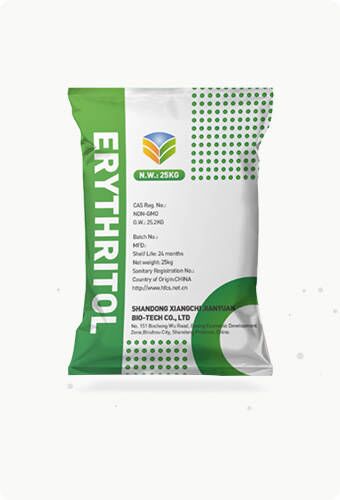

>Application of Erythritol:
Erythritol has good physical and chemical properties and biological activity, and has wide application and good prospects in THE food processing industry, pharmaceutical industry, chemical industry and many other fields.
>Applications in the food processing industry:
Erythritol is used in low-sugar and low-calorie beverages and sweets such as candy, chewing gum, and chocolate to meet market needs and meet consumer health requirements.
It is also used in combination with other sweeteners and can significantly suppress the after-bitterness of high-intensity sweeteners, and produce a taste similar to sucrose and a real sweetness.
It mask and improve the unpleasant taste of added vegetable juices, vitamins and important extracts in nutritional beverages.
Erythritol is widely used in functional foods for special populations such as diabetes, glucose intolerance, and obesity.
In alcohol, erythritol can promote the hydration of ethanol at a lower concentration, so it can alleviate the stimulating effect of ethanol.
Erythritol can also significantly improve the bad smell of plant extracts, collagen, peptides and other substances. Therefore, erythritol has been added to the formula of some collagen products to improve the taste."
>Applications in the pharmaceutical industry:
In recent years, the anti-caries properties of erythritol have been a hot spot in the application of erythritol. (In vitro artificial caries experiments have confirmed that the mixture of erythritol and milk can inhibit the adhesion and growth of Streptococcus mutans in biofilms, promotes the remineralization of demineralized tooth enamel, and prevents the development of caries to a certain extent. In the future, erythritol-milk mixture, as a safe and nutritious food, is very likely to become another effective way to prevent caries instead of fluoridated milk. Li Weidan's experiment showed that erythritol has a good effect on periodontitis. The main pathogenic bacteria, Porphyromonas gingivalis, has obvious inhibitory effect and can reduce its adhesion on the surface of cementum, which provides a new direction for the prevention and treatment of periodontal disease. Erythritol has obvious inhibitory effect on Porphyromonas gingivalis, the main pathogenic bacteria of periodontitis, and can reduce its adhesion on the surface of cementum, which provides a new direction for the prevention and treatment of periodontal disease. In addition, erythritol can also inhibit the growth and acid production of various caries-pathogenic streptococci and fluoride-resistant bacteria. At present, more and more anti-caries products use erythritol instead of traditional fluoride and antibiotics).
The antioxidant properties of erythritol are not only added to lemon juice drinks to protect VC, but also can be used as an antioxidant in the body to prevent oxidative stress damage in the body.
Erythritol has the characteristics of low hygroscopicity, good dispersibility, good taste, and good compatibility with various drugs. It is being more and more used in tablet coating, pharmaceutical excipients, inhalation drug carriers or excipients, and various other fields."
>Application in chemical industry:
Erythritol has been used in toothpaste because of its anti-caries properties, promoting the decomposition of dental plaque, and maintaining oral health. KAO and LG Bamboo Salt Shine White series toothpaste are all added with erythritol.
Erythritol not only has the same effect of moisturizing and improving skin roughness as glycerin, but also has low viscosity and cooling effect. It has been used by Shiseido in Japan in many series of skin care products."
>Applications in other fields:
Sugar alcohols are a kind of non-combustible materials with a wide range of sources and are used as phase change materials for thermal energy storage. Erythritol has received the top most attention and has been widely used in waste heat recovery, solar cookers, absorption refrigerators, automotive coolant waste heat recovery systems, etc."


Nature | Characteristic |
· Taste | The relative sweetness is 0.65, it has a cool feeling, pure sweet taste, no after-bitterness, mixed with other sweeteners to cover up bad taste." |
· Heat of Dilution | The heat of dilution is -96.86kJ/kg, which is three times that of glucose, and it will absorb more energy when dissolved in water, giving it a refreshing feeling." |
· Low moisture absorption | It has good crystallinity and does not absorb moisture (it does not absorb moisture in an environment with a relative humidity of 90% at 20°C). It is especially suitable for processing chocolate, candy, etc." |
· Solubility | At 20°C, the solubility is only 37%, and it can be mixed with other sugar alcohols to prevent crystallization and maintain a stable texture." |
· Heat and acid resistance | Stable to acid and heat, no decomposition, no discoloration, no Maillard reaction at 160°C, suitable for foods with strict color requirements." |
· Low water activity and high osmolarity | Small molecular monosaccharides can reduce water activity. 25°C, 36% aqueous solution, water activity is 0.91; high osmotic pressure, 20°C, 15% aqueous solution osmotic pressure is 1861mOsm/kg, with strong anti-corrosion, extended shelf life." |
· Freezing point depression and viscosity characteristics | It has the characteristic of freezing point depression. At 25℃, 20% (w/w) erythritol aqueous solution has a freezing point of -4.1℃. Compared with other sugar alcohols, the freezing point depression is larger, and the viscosity at this time is only 3.0cp , Conducive to use in food processing. |
· Antioxidant | It can scavenge free radicals and inhibit their generation; adding erythritol to lemon juice drinks not only improves the taste of the drinks, but also protects the vitamins in the drinks and prolongs the shelf life." |
> Physiological function of erythritol:
"Low in calories. The molecular weight is very small, most of which can enter the blood circulation, and only a small amount directly enters the large intestine as a carbon source for fermentation. Since the human body lacks the enzyme system to metabolize erythritol, it cannot be digested and degraded, and can only be excreted in urine. Therefore, erythritol can be regarded as a ""zero"" calorific value ingredient.
High tolerance and few side effects. Generally, the intake of sugar alcohols often produces diarrhea and flatulence, so limit the daily intake to less than 20g. The Ministry of Health stipulates the intake of erythritol as ""adding on demand"" in the ""2007 No. 12"" announcement.
Adaptability to diabetics. After taking it, it will not cause an increase in blood sugar, so taking erythritol in daily life is safe for special consumer groups such as diabetics and other sugar limiters.
Non-cariogenic properties. Bacteria in the oral cavity cannot utilize and ferment erythritol, which does not cause a decrease in the pH value of the surface of the teeth in the oral cavity, avoids plaque, and prevents dental caries.
Other physiological functions. Erythritol can promote the growth of bifidus factors, maintain the balance of intestinal microecology; promote the synthesis of glycogen in the liver, improve liver function and resist fatty liver. It is an ideal auxiliary drug for patients with hepatitis complications.
Erythritol can be used as a component and additive of high molecular polymers to produce polyether polyols, alkyd resins, polyesters, etc.
In the chemical industry, erythritol can also be used as an intermediate in organic synthesis and a raw material for the manufacture of paints, explosives and other products."